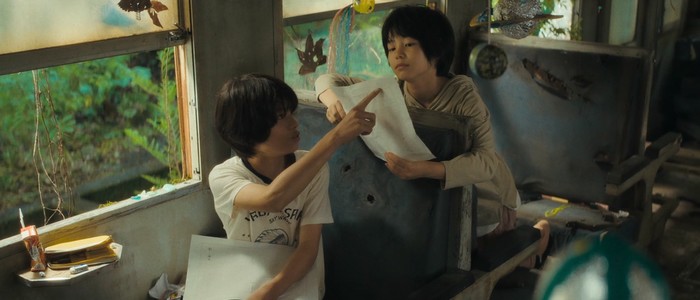
Monster is a Japanese movie about a fifth-grade student and his troubles at school. The main character is a child who lives with his single mother. Lately, she has noticed unusual behaviour from her son. He hides secrets, brings suspicious items home, and even goes missing at night. When she confronts the principal and teachers, they won't speak candidly about what happened on campus. Her quest for answers triggers a chain of consequences.
A complex movie told from various perspectives, Monster examines the power of perception. Each character has a different reality as insecurities cloud their judgment. I'm impressed by the story's thought-provoking themes, elaborate metaphors, and meaningful social commentary. I also appreciate the cast's powerful performances. Although not a typical gay romance film, its poignant messages will resonate with LGBTQ+ viewers.
Monster Movie Summary
Title:
怪物
Movie Info:
Japan (2023)
Genre:
Drama
About:
Monster is a mature & interesting film.
Is Monster BL?
No, but it has LGBTQ+ themes.
Plot
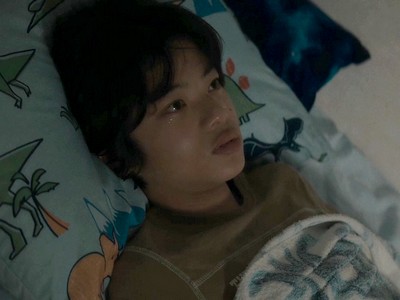
Minato is an elementary school student in the fifth grade. His father passed away. He lives with his mother, a single parent who runs a laundromat. They have a close relationship. Each morning, Saori ensures her son leaves home safely on his way to school. Then, she works for the whole day and returns during the evening. Saori's customers sometimes share neighbourhood gossip with her. There's a recent rumour that her son's teacher, Mr. Hori, was seen with a bar hostess.
Lately, Saori has observed signs of unusual behaviour from her child. Minato gave himself a haircut at home, claiming his long hairstyle is against school rules. She tries asking for more information, but he seems reluctant to answer. In addition, Saori discovers her son's water bottle is filled with dirt. He explains it was used for a science experiment. Once again, Minato acts evasively and won't address her concerns. Saori also noticed one of his shoes has gone missing. These puzzling incidents begin to trouble her.
One night, Saori worries when her child hasn't returned home after school. She calls the other families to discover his whereabouts. Surprisingly, she finds him inside an abandoned train tunnel, mumbling about monsters. On their way home, Minato injures himself and must receive medical attention. So far, Saori has avoided interrogating her son out of respect for his privacy. Yet, these recent events are baffling and upsetting. She wants to know what Minato is hiding from her.
Minato apologizes to his mom for what happened. She starts asking questions. Alarmingly, he informs her there's something strange with him. He is a monster whose brain has been switched with a pig's. Saori is startled by the response. She demands to know where these thoughts came from. Her first guess is Kamata, one of the troublemaking students in his class. Minato runs away and doesn't want to reply. This time, Saori won't back down. She presses him for answers.
Minato describes horrific events that occurred in the classroom. Saori feels outraged by her son's traumatic experiences. She arrives at the school, demanding to meet with the authorities. The principal is an aloof woman who doesn't seem interested in the complaints. She only takes notes and barely reacts to the scandalous allegations. Her indifference enrages Saori, who escalates the accusations. She meets with the other teachers, yet they nervously dodge her line of questioning. Saori won't let the matter rest until someone accepts accountability.
Monster Movie Trailer
Monster Cast
Characters
Minato
Souya Kurokawa (黒川想矢)
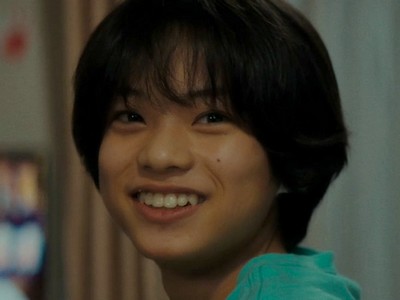
Minato Munagi is a fifth-grade student who lives with his single mother. His father has passed away. Minato has a close relationship with his mom. However, she feels troubled by his recent evasiveness. Minato seems to be acting suspiciously and hides secrets from her.
Souya Kurokawa
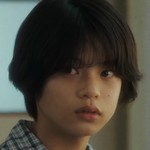
Souya Kurokawa (黒川想矢) is a Japanese actor. He is born on December 5, 2009. He has a leading role in the 2023 Japanese movie, Monster.
Saori
Sakura Ando (安藤サクラ)
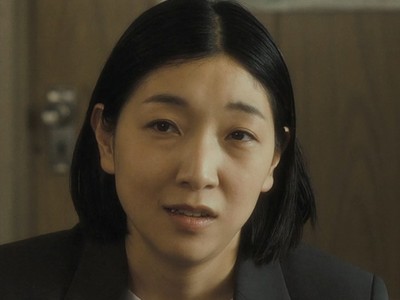
Saori is a single parent and the mother of Minato. Her husband has passed away, leaving her to be the sole breadwinner of the family. Saori runs a laundromat during the day. Lately, she's alarmed by her son's suspicious behaviour. Saori wants to respect her child's privacy, yet she worries about him.
Sakura Ando

Sakura Ando (安藤サクラ) is a Japanese actress. She is born on February 18, 1986. She has a leading part in the 2023 Japanese movie, Monster.
Hori
Eita Nagayama (永山瑛太)
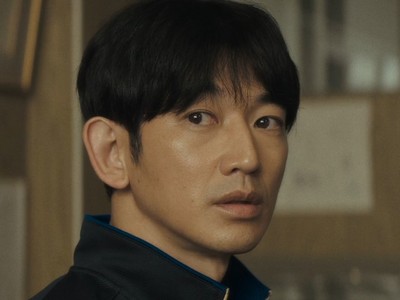
Hori is a young elementary school teacher who gives lessons to Minato and the other fifth graders. Recently, Hori became the subject of neighbourhood gossip. A rumour claims he was seen with a bar hostess. Even Hori's colleagues know about the scandal.
Eita Nagayama

Eita Nagayama (永山瑛太) is a Japanese actor. He is born on December 13, 1982. He is one of the leads in the 2023 Japanese film, Monster.
Yori
Hinata Hiiragi (柊木陽太)
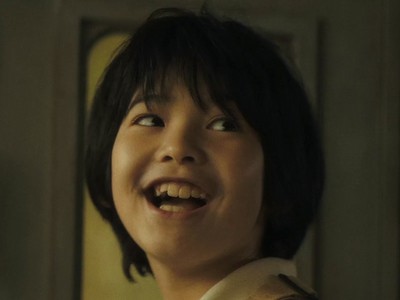
Yori is a fifth-grade student and one of Minato's classmates. Like Minato, he comes from a single-parent family. Yori's father is a big-shot realtor who looks down on teachers. Unlike his arrogant dad, Yori has a sweet and gentle disposition.
Hinata Hiiragi
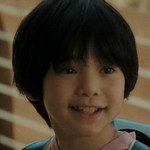
Hinata Hiiragi (柊木陽太) is a Japanese actor. He is born on September 10, 2011. He has a leading role in the 2023 Japanese film, Monster.
Supporting Cast

Principal
Yuuko Tanaka (田中裕子)
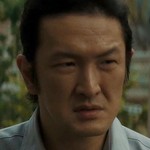
Yori's dad
Nakamura Shido II (二代目中村獅童)

Hori's girlfriend
Mitsuki Takahata (高畑充希)
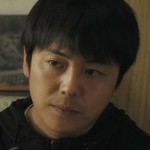
Kanzaki
Ryu Morioka (森岡龍)

Kida
Harune Iida (飯田晴音)

Kamata
Haruto Kobayashi (小林空叶)

Teacher
Akihiro Kakuta (角田晃広)

Teacher
Daisuke Kuroda (黒田大輔)

Teacher
Ayu Kitaura (北浦愛)

Principal's husband
Shiyun Nakamura (中村シユン)
Monster Review
Review
Movie Review Score: 8.9
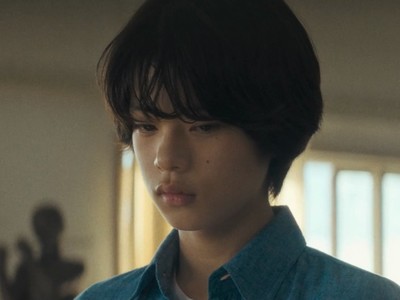
Monster is a brilliant movie with a sophisticated story, powerful performances, and thought-provoking messages. My review is incredibly positive, and I'm not alone in my appreciation. Backed by critical acclaim, it even made Barack Obama's annual list of favourite films! The director, Hirokazu Koreeda, also boasts a lifelong career of festival awards. These impressive credentials speak for themselves. Monster is a successful cinematic work that has inspired many viewers worldwide. And yes, it lives up to all the hype!
This story begins from the mother's point of view. Poor Saori worries about what is happening to her child. The filmmaker guides us through a concerned parent's turmoil, highlighting her confusion and frustration. Fear stands out the most prominently. Beyond feeling unsettled by Minato's strange antics, we are terrified due to Saori's helplessness. The more she investigates, the less she understands her son's troubles. Monster has created an eerie mystery with heightened emotions, notably dread, doubt, and desperation. The movie's compelling first arc keeps viewers on edge.
Monster shifts to the teacher's perspective. Unlike the mom, Mr. Hori sees the school situation differently, adding complexity to the narrative. The movie experiments with perception and demonstrates how each character has a partial version of reality. In my opinion, the second arc isn't as engaging. The film is prone to dramatization with a few contrived moments. Nonetheless, the story remains intricately crafted and uses clever metaphors to convey its ideas. It offers insightful commentary about professional reputations, public scrutiny, and power dynamics.
The movie's third arc reveals the missing puzzle pieces and clarifies past events. You'll finally know the real story behind Minato's experiences. Notably, these scenes showcase the sensitive performances of the young leads. Yori's actor (Hinata Hiiragi) brings an innocent charm, while his costar (Souya Kurokawa) emotes with delicate expressions. Likewise, the adult cast gives mature and nuanced performances. In addition, the film features striking visuals. The cinematographer transports viewers to a child's wonderland with gorgeous landscapes and enchanting imagery.
Monster isn't a romantic drama. There may be a childhood crush, but the plot doesn't revolve around falling in love. With that said, the movie appeals to gay cinema enthusiasts. Its meaningful themes resonate profoundly with LGBTQ+ audiences. The film captures the mental strain of hiding a secret, the pressure of fitting in, and the anguish of rejecting your identity. Those who have endured the same struggles may recognize many parallels, like a mirror to your adolescent trauma. The poignant story about inner demons will tug at your heartstrings, regardless of sexuality.
From angsty exchanges to downtrodden characters, Monster is a bleak movie. Most of the story feeds into your pessimism, making you dread the worst-case scenarios. Despite the distressing journey, the film reminds us not to lose hope. The closing scenes are motivational, shining a figurative light at the end of a dark tunnel. I adore the empowering messages from the exhilarating ending. Overall, Monster is intriguing, intelligent, and emotionally impactful. I agree with President Obama's endorsement. This cinematic masterpiece belongs on my list of favourites.
Summary
Intelligent story
Monster has a sophisticated story that explores inner demons poignantly. In addition to the thought-provoking messages, it offers astute commentary and brilliant metaphors.
Childhood romance
There is a childhood crush, but the love story isn't the central plot. Despite the lack of romance, this movie deals with LGBTQ+ themes and should appeal to gay cinema enthusiasts.
Sensitive acting
The cast's sensitive performances elevate the movie. Minato's actor (Souya Kurokawa) emotes delicately, while his charming costar (Hinata Hirragi) infuses each scene with his innocence.
Happy ending
Monster has a happy ending for the leads. Despite their distressing journey, they find a figurative light at the end of the dark tunnel. The closing scenes are motivational with empowering messages.
Wonderful artistry
The movie has a quietly discomforting atmosphere that matches the eerie tone of the story. Also, its striking visuals showcase wonderful landscapes and enchanting imagery.
89%
Monster is a poignant coming-of-age movie with sophisticated storytelling, intelligent messages, and powerful performances. Its meaningful themes resonate with the LGBTQ+ community.
Monster Movie Explained
Analysis
- What is the monster?
- Childhood
- Conformity
- Humanity
- Parenthood
- Family pressure
- Accusations
- Parent vs teacher
- Reputation
- Accountability
- Abuse
- Rebirth
- Little monsters
- Denial
- Heteronormative
- Rescue
- Principal
- Perspective
What is the monster?
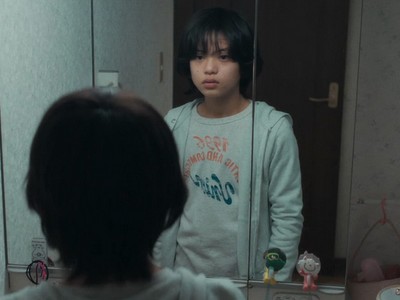
Before starting the movie, the ambiguous title piques our curiosity. What exactly is the monster? We can cross off a few suspects from the list. There's no Godzilla stomping through the city or Dracula hunting for prey at night. Yet, the scariest monsters are the ones we don't recognize instantly. They hide from plain sight, masking themselves behind trusted personas. The terror may come from your parents, teachers, or yourself. Imagine looking in the mirror reflection and seeing a monstrosity. That's the ordeal our protagonist must face.
The movie's title carries many meanings. There's more than one monster in this story. However, let's start with the most powerful beast. Minato's inner demons are his worst enemy. He sees his same-sex attraction as an abnormality, a secret trait other boys don't have. These feelings scare Minato since being gay makes him different from almost everyone else. His classmate, Yori, becomes the target of bullying because he behaves unconventionally. The gentle boy who plays with other girls is stigmatized by his peers. Minato observes the cruel treatment of not conforming to the norm.
Heartbreakingly, Minato grows up thinking he is the monster. Being gay in a heteronormative society means he internalizes self-loathing views, perceiving his identity as subhuman. Minato uses an offensive analogy to describe his distress: "My brain was switched with a pig's!" He wants to articulate how his thoughts differ from other straight boys. Their minds function normally because they're attracted to the opposite sex. In contrast, his brain must be deformed since he can't think like them. These views are wrong, but that's how Minato perceives himself.
Childhood
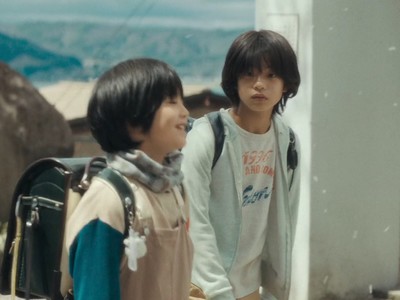
Most gay coming-of-age stories feature teenage protagonists. These narratives focus on first loves in high school romances. However, the reality is that self-discovery occurs earlier in your youth. You start becoming aware of your attraction during the late stages of childhood. Minato, a fifth-grade student, is around the age when his curiosity forms. Our protagonist is old enough to question whether he likes boys, girls, or both. Monster is one of the rare movies that examines sexuality in its earliest phase.
Minato realizes he likes the same gender, yet he struggles to accept his attraction. Ultimately, he's still a child. His thinking isn't as nuanced as a teenager or an adult. He lacks the knowledge and self-assurance to come to terms with his emerging sexuality. Some gay men in their twenties or older still experience doubt about their identities. It's no surprise Minato feels anxious at his young, delicate age. Our protagonist may gain a better understanding once he matures. But right now, he's particularly susceptible to confusion, misconceptions, and self-loathing.
One of Minato's worst disadvantages is that he has no LGBTQ+ resources. He lacks mentors or role models to guide him through this tricky developmental period. Minato feels like he can't confide in his mother or his teacher, who express their traditional views about families and masculinity. Also, the only gay representation he sees is a stereotypical figure on television. "My skin is super supple!" As his mom & classmates mock this comedic caricature, Minato is reminded that his sexuality becomes a source of ridicule. I'm a funny punchline to the rest of the world.
Conformity
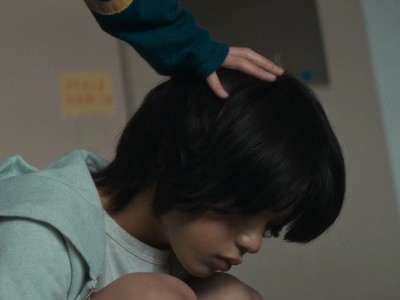
Minato doesn't want to feel like a monster, so he copes by denying his attraction. When Yori caresses his head, Minato enjoys the intimate gesture until he notices someone nearby. After returning home, Minato chops off his hair. The long hairstyle is associated with temptation, carrying a memory he wishes to resist. The haircut also symbolizes Minato's desire to alter his identity. Unhappy with being gay, our protagonist tries to change himself and conform to society.
Minato wants to fit in with his classmates. Fearing the gay rumours, he distances himself from Yori. They can only be friends in secret. Also, Minato joins the bullies in tormenting Yori. He doesn't take an active role in the pranks. Even so, he succumbs to peer pressure and still participates. He fails to intervene when they lock Yori in the washroom. The one time Minato resists, the other kids accuse them of being a couple. Minato panics so much that he beats up Yori. I'll prove my heterosexuality by hurting my gay companion! This fight makes Mr. Hori perceive Minato as an aggressor.
The bullies taunt another student for her appearance. They force Yori to join their insults, but he won't comply. "I can't say what I don't think." The camera cuts to a reaction shot of Minato, juxtaposing his cowardice with Yori's courage. Unlike his friend, Yori stands firmly against the norm. He won't compromise his identity, even if the others tease him afterwards. Besides this incident, Yori defies gender roles by hanging out with his female classmates. The other guys question his masculinity, but he feels comfortable being himself. He doesn't need to behave like everyone else.
Humanity
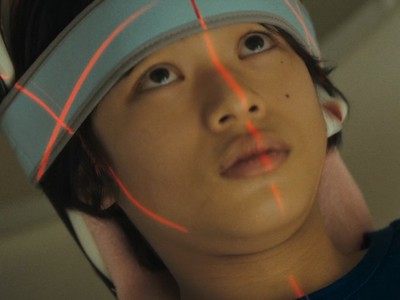
A defining feature of monsters is that they lack humanity. These creatures don't follow a moral code. They have no empathy, principles, or a sense of right and wrong. Humans can be monsters, and we often use it as a derogatory term to describe bad guys who act maliciously. While your description may vary, some people consider bullying as monstrous behaviour. In my opinion, the targeted harassment that Yori experiences has no signs of human decency.
The self-loathing Minato perceives himself as a monster due to his sexuality. So, he joins the bullies and pretends to be like everyone else. Conformity maintains his illusion of normalcy. Yet, Minato must hurt his friend to fit in. His cruelty crosses into inhumanity. In his attempt to stop feeling monstrous, Minato becomes savage. He attacks Yori, lashing out violently like an untamable beast. Minato wasn't a monster before, but now he may have transformed into one. There's a tragic irony to his situation.
Despite his misconduct, Minato has a conscience. He feels remorseful about tormenting Yori and apologizes once they are alone. Minato also tries to be kind. When Yori misplaces his shoes, Minato offers one of his. Likewise, he causes a classroom diversion to stop the bullying. While Minato participates in the harassment, he doesn't hurt Yori out of malice. It's a self-preservation tactic. Minato reverts to being a sweetheart when not faced with peer pressure. Our protagonist has moments of moral weakness, but Minato isn't a monster since he still holds onto his humanity.
Parenthood
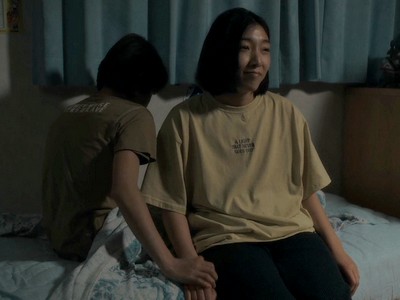
Minato's mom doesn't know about her son's turmoil. He puts on a facade at home, not revealing the agony over his sexuality. Saori still notices troubling signs, like the sudden haircut. He lies about the reason, which she must have known. Despite her curiosity, Saori tries not to be intrusive. She gives him freedom instead of hovering like a helicopter parent. The movie includes clever symbolism when Saori opens the shower door, causing Minato to protest about his privacy. This scene alludes to her dilemma with respecting his boundaries.
Saori is concerned about her son's recent strange behaviour. The haircut, missing shoe, and mud in the water bottle trigger her intuition that something is bothering him. Yet, Minato won't confide in her. He shoos away his mom during the tribute to his dad, protecting his inner thoughts. Minato's need for privacy turns into a frustrating communication barrier. Although his secrecy worries her, she doesn't want to be the overbearing parent who interrogates her child. Saori shows respect and waits for him to open up. Minato will come to me when he's ready to talk.
Saori tries to be a good parent. She talks to Minato like an equal without patronizing him. Saori cheers him up when he seems down and gives encouragement when he expresses doubt. She also avoids lectures. Notice Saori's calmness when she finds Minato in an abandoned tunnel, not wanting to escalate the tension. Other parents would've freaked out in the same situation. WTF are you doing there!? Mr. Hori judges Saori since he stereotypes her as an overprotective single mom. However, he's wrong. Saori approaches parenting with patience and understanding.
Family pressure
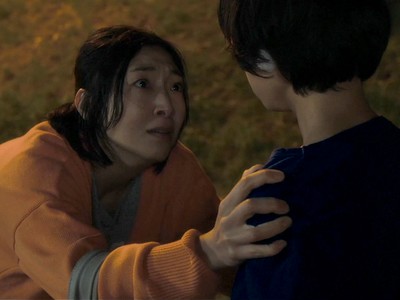
Minato's mom is family-oriented. As a widow, Saori cherishes the time spent with her late husband. She places a high sentimental value on their marriage. Likewise, raising a child is one of Saori's proudest achievements. Motherhood brings her immense joy. Based on her experiences, Saori believes getting married and starting a family will also make Minato happy. She emphasizes their importance to him, like a parent instilling wisdom into their child.
Saori shares her aspirations for the future. She hopes Minato can marry and have kids of his own. Unknowingly, she places a heavy psychological burden on Minato. He can't subscribe to a traditional family life due to his sexual orientation. Disappointing his mother and not fulfilling her expectations seem inevitable. Besides feeling like an undutiful son, Minato agonizes over missing two fundamental experiences: marriage and children. According to his mom, starting a family is life's greatest treasure. Does that mean Minato is deprived of this happiness forever?
A terrifying moment in the movie is when Minato jumps out of the car. He took extreme action to escape from his despair, even if it meant hurting himself. Saori doesn't realize how much she has distressed Minato. Expecting your offspring to marry and carry the family legacy is common in our heteronormative society. Yet, Minato can't achieve this tradition. "Sorry I can't be like dad." The disapproval of bigoted parents isn't the only beast for LGBTQ+ children. Like in Minato's case, the anxiety of disappointing your loving family can also contribute to your inner demons.
Accusations
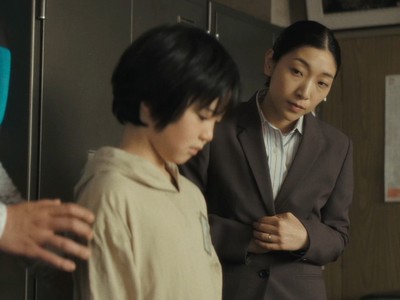
Minato isn't severely injured after jumping out of the car, but it remains a stressful night for him and his mom. Saori asks for answers. She can only help her son's troubles if he communicates. Minato hints about having a pig's brain and feeling like a monster. His self-loathing is too complex to describe, so he articulates through these vague metaphors. After seeing her mom's frightened reaction, Minato fears upsetting her. He thinks confessing his same-sex attraction will break her heart.
Instead of revealing a painful secret, Minato tells an outrageous lie and blames his teacher. Due to their past altercation, Minato could easily embellish some parts of the truth. Indeed, Mr. Hori did hit his nose and twisted his arm. In reality, they were minor accidents when his teacher stopped a commotion. Minato describes other unpleasant experiences, likely using ambiguous language from a child's limited vocabulary. His distraught mom may have misconstrued the severity. Saori's emotions cloud her judgment as she paints Mr. Hori as a monster.
Saori reports the teacher's physical and emotional abuse to the school authorities, but they seem cautious around her. Firstly, the staff is skeptical of the allegations. They question her credibility, especially after hearing their colleague's explanation. Secondly, the school wants to avoid liability. Showing sympathy may imply an admission of guilt, bringing legal repercussions. It's best to use neutral language and offer generic apologies. Thirdly, they want to downplay the scandal. Their top priority is to make this disruptive parent and her accusations go away.
Parent vs teacher
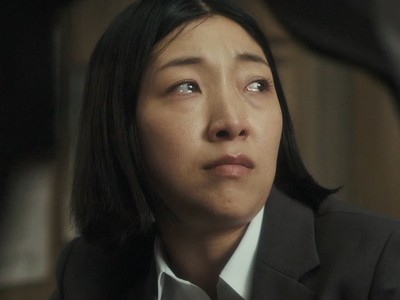
Saori expected support and cooperation from the school. Firing the abusive teacher who hurt her son seems like the morally correct move. She is horrified when the authorities don't take her side. They bow, apologize, and do nothing. Saori's helplessness grows since her child continues to face his tormentor in the classroom. What can she do to make his suffering stop!? During a follow-up school visit, Saori hits her car while parking. This accident is a symptom of mental strain, indicating she has lost her composure.
Saori was civilized during her first meeting with the authorities. Later, she grew hostile and resorted to personal attacks. "Am I talking to human beings? I don't see any life in your eyes!" Saori questions the staff's livelihood since she perceives their inaction as inhumane. She takes offence to Mr. Hori eating candy, treating a seemingly irrelevant gesture as an incriminating sign of his apathy. Saori also brings up the principal's family trauma and stabs at the emotional wound. Saori is trying to appeal to the headmaster's empathy. Show some damn compassion and protect my child!
Mr. Hori has a different perspective on the situation. He feels falsely accused of outrageous misconduct. His so-called physical abuse is a harmless accident, while the other allegations are lies. Hori wants to defend himself, but his colleagues fear tensions will escalate. Indeed, he makes a jab about single mothers in the heat of the moment, like pouring gasoline on a wildfire. In his defence, Hori feels personally attacked by Saori's slander. This typical boy mom thinks her son can do no wrong, so he retaliates with his own baseless accusation. Your beloved child is a bully!
Reputation
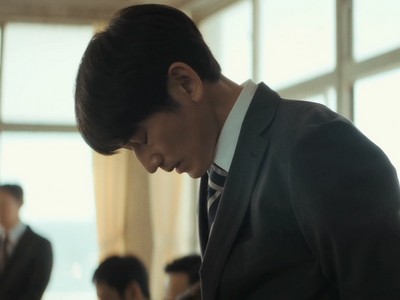
Before Minato and his mom made up lies about him, Hori had already suffered from a sketchy reputation. The neighbourhood gossiped about his affair with a bar hostess. Allegedly, a student saw him with a woman around the area, which was scandalous enough to trigger the rumour mill. In reality, Hori and his girlfriend were nearby due to coincidence. Yet, nobody bothered to verify the truth. As the undignified lies circulated, they tarnished Hori's moral authority. Tsk tsk, this elementary school teacher lacks virtues!
Mr. Hori's coworkers tease him over the rumour, indicating lost respect. Likewise, Saori weaponizes it to undermine his credibility. This situation illustrates the destructive impact of defamation. Like a small flame that grows into an engulfing blaze, a bare-faced lie turns into the distorted truth. Logically, a child's accusation shouldn't have the power to destroy an adult's reputation. Yet, a school setting is complicated. A student's claims may be given significant weight, especially when backed by a vocal parent. Hori becomes the innocent victim of a ruthless character assassination.
Like Saori, Hori expected support from the school. He assumed his fellow educators would take his side, defending him against false allegations. However, Hori is naive to trust his colleagues. The authorities don't care about him. They only protected their employee to uphold the school's image. Once the situation escalated, Hori became a liability. The principal explains, "What actually happened doesn't matter." In this parent vs. teacher battle, the truth is overshadowed by perception. Sadly for Hori, he has gained a wrongful reputation as a monster who hurts kids.
Accountability
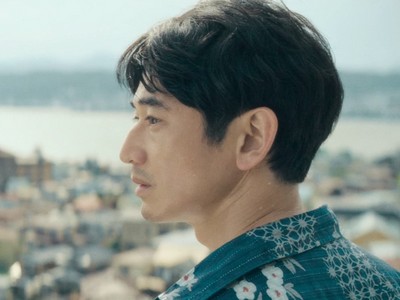
The school has downplayed the scandal, but Saori insists on seeking accountability. The pitchforks are out. This protective parent is on a witch-hunt, looking for the villain responsible for her child's pain. Previously, Saori couldn't identify what troubled her son. Minato's unhappiness seemed vague and conceptual. But now, Saori has found a culprit to target her pent-up frustration. Mr. Hori is an easy scapegoat as she defames his character and demonizes him. You are a monster!
Minato's lie has severe consequences. With his career and credibility at risk, Hori cracks under the pressure. Firstly, he loses his temper and gets aggressive with a student. Uh-oh, he's a physical threat! Secondly, Hori follows the school's advice by admitting guilt at a press conference. Yet, they don't have his best interests at heart and fire him afterwards. Besides losing his job, Hori's disgraced reputation ruins his personal life. His girlfriend calls off their relationship, while his neighbours harass him. These setbacks almost drive the former teacher to suicidal despair.
Hori feels confused by Minato's random lies against him, like the victim of an indiscriminate attack. He gains clarity at the end of his story arc. Hori realizes he misjudged Minato & Yori's relationship. He perceived Minato as a bully based on a fragmented view of classroom dynamics. He created an imaginary monster instead of understanding the situation better. In reality, Minato was a scared child who needed adult guidance, which his teacher failed to provide. Hori is partially responsible for his own downfall. He should have intervened and supported his students earlier.
Abuse
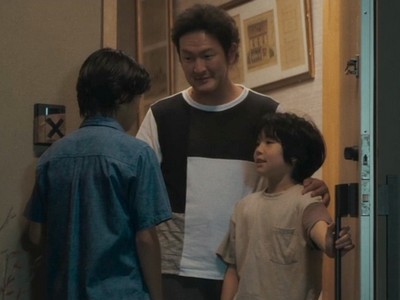
Despite their morally ambiguous behaviour, most characters in this movie aren't monsters. Minato, Hori, and the principal receive this label, either projected by others or imposed on themselves. Yet, they have consciences and reflect on their conduct. The school bullies need adult intervention, but they have a chance at rehabilitation. The only irredeemable beast is Yori's dad. This homophobic parent is domestically violent, inflicting burns and bruises on his child's body. He's the real villain who should face persecution.
Besides physical violence, Yori's father is psychologically abusive. He claims his gay son has a disease, a prejudiced view sadly common among bigots. He poisons Yori's thoughts, making him believe he needs a cure. The "pig's brain" insult also originated from the evil dad, who uses dehumanizing language to describe his child. The fact that Minato repeats this offensive analogy shows how harmful doctrines can spread. Young minds are particularly vulnerable to toxic influences. They absorb destructive ideas, unhealthy habits, and hateful language from their surroundings.
Worst of all, Yori's father goes unpunished. A few adults appear wary of Yori's home life. Sadly, they don't know the severity of his mistreatment behind closed doors. Mr. Hori should have raised concerns over the red flags, but the false accusations against him diverted his focus. Only Minato is informed about his friend's abuse, yet reporting it to the authorities must be daunting for a child. He feels intimidated by the consequences. Remember that scene when Minato leaves Yori in the washroom stall? Minato faces a similar moral dilemma over Yori's dad.
Rebirth
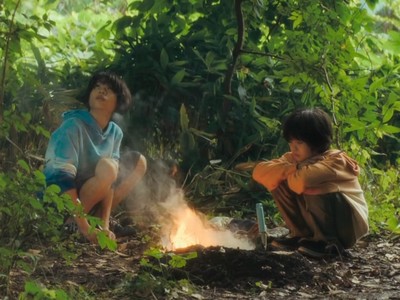
Considering his upbringing, Yori has a surprisingly sweet disposition. I assume his mother must carry all the good genes because he didn't inherit them from his dad. This gentle, tenderhearted boy is stronger than anyone can imagine. Despite enduring horrific abuse at school and home, he still shows kindness toward others. He forgives Minato and never holds a grudge when his friend joins the bullies. Yori's childlike innocence has protected him from viewing the world cynically.
Beneath Yori's easygoing attitude, the long-term trauma has warped his mind. An alarming symptom is that he develops a morbid fascination with fire. He carries around a lighter like a toy. Minato accuses Yori of burning the bar. While this allegation is implausible, it reveals Minato's observation of his friend's threat level. Yori poses a danger to himself or others. Notice how Minato extinguishes the bonfire and confiscates the lighter. He tries to stop Yori's destructive streak. "Maybe a fire truck will come." The line implies Yori sees fire as distress signals, hoping someone may rescue him.
Yori also becomes obsessed with rebirth. He burns a cat's corpse, believing the ritual helps it transition to the next life. Both boys frequently discuss the idea of reincarnation. This solemn topic appeals to Minato and Yori since they're discontent with their current lives. These children feel so hopeless that they only look forward to happiness in another destiny. In more pessimistic terms, rebirth can mean suicide. It captures a struggle faced by some LGBTQ+ youths. They perceive death as an escape from pain and hope to be reborn into less challenging circumstances.
Little monsters
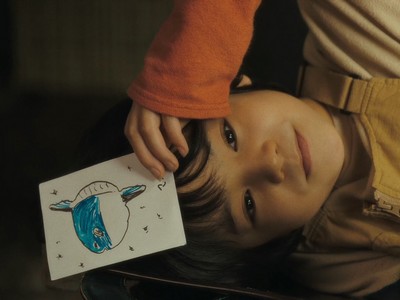
Monster is a bleak movie. The sombre mood mirrors Minato and Yori's despair. However, the story's third arc introduces lighthearted scenes. As the two friends escape civilization, they retreat to a refuge in the forest. With nobody else nearby, they can relax and be themselves. The boys run around, play games, and laugh heartily. They create an enchanting playground by decorating an abandoned train cart. Our protagonists finally seem happy, thanks to each other's companionship.
Minato and Yori play a cute card game where they guess the creature's identity. During one round, Yori describes a sloth. "When you get attacked, you let go of all your strength and give up. You stop feeling." Instead of answering correctly, Minato replies: "Am I Hoshikawa Yori?" Wow, the movie delivers a heartbreaking line during a seemingly innocent scenario. Yori's statement has a deeper meaning. It refers to his coping mechanism when abused at home or school. He detaches from the pain. The fact that Minato connects this experience to his friend's life is depressing.
Yori and Minato create a fun anthem to accompany the game. They repeat the question "Who's the monster?" in a singsong tune. Earlier, Minato's chanting seemed ominous. From his mom's perspective, her son's voice sounded like demons possessed him. With context, we realize there's nothing sinister. The kids have reclaimed the term "monster" and attached a positive connotation, like Lady Gaga! This movie suggests some monsters aren't inherently dangerous. If you take the time to understand those different from the norm, you'll realize they mean no harm.
Denial
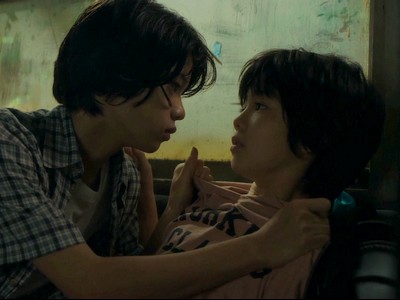
Besides playing games, our protagonists talk a lot. Minato is secretive and doesn't speak his mind around others. Yet, he can communicate openly with Yori. He even mentions how his dad died with a mistress. You must trust someone enough to reveal this intimate detail, indicating their comfort with confiding in each other. These two best friends also exchange coded messages in school assignments. They have an exclusive language not even their parents or teachers know about.
As Minato and Yori strengthen their emotional bond, they develop underlying feelings beyond friendship. A crush is common among kids their age. Their attraction crystalizes during an intimate moment. Yori pulls his companion into an embrace to confirm his interest. Yet, Minato pushes him away and denies the affection. Self-loathing has overtaken him. Despite breaking many communication barriers, there's one psychological wall he has yet to conquer. Later, Minato fights his friend in class. The violent outburst stems from Minato's internalized homophobia.
After the fight, Minato misses his friend and wants to meet in the middle of the night. The good news is that Yori still wants to hang out with him. The bad news is that Minato's mom has found their secret sanctuary. This place used to be the children's paradise away from everyone else, but their privacy has been compromised. Minato watches Yori disappear in the shadows, reminding him romance and family cannot coexist. On the ride home, Minato jumps out of the car to escape his unhappiness. He feels hopeless about his future, which will deny him an honest love life.
Heteronormative
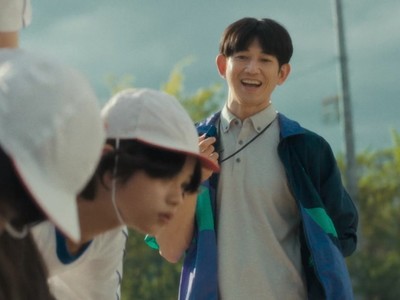
Minato and his mom have a special game. As they walk on the white lines on the road, the goal is to avoid crossing the boundaries. Saori jokes, "If you go over the white line, you're in hell." This game is a clever metaphor for heteronormativity. If you abide by the rules and follow the straight, predefined path, life will feel easy. But for anyone who strays off-course, you're in metaphorical hell. The LGBTQ+ community knows all about not going straight. Indeed, their journey can feel hellish.
Heteronormativity is a significant reason why Minato denies his same-sex attraction. Society has ingrained a misguided belief in him that being straight is the only normal. As a gay youth, Minato represses his desires since he believes liking guys is an anomaly. A characteristic of heteronormativity is tied to the masculine ideal. Under this belief system, men are expected to show stereotypically male qualities. Or else you aren't normal. Mr. Hori uses gender microaggressions like "You call yourself a man?" and ridicules his student for lacking athleticism. He reinforces Minato's insecurities.
As mentioned before, Minato's mom unknowingly pushes heterocentric values onto her son. Her family-oriented chats exclude the possibility that Minato can't marry or have kids. Neither Saori nor Hori have wicked intentions. They don't mean to marginalize Minato on purpose. Nonetheless, they assume a heterosexual perspective as the default, overlooking those who don't conform to the norm. They'll benefit from broadening their views and minding their language. Understand diversity instead of sticking to rigid gender roles or assuming about sexual orientation.
Rescue
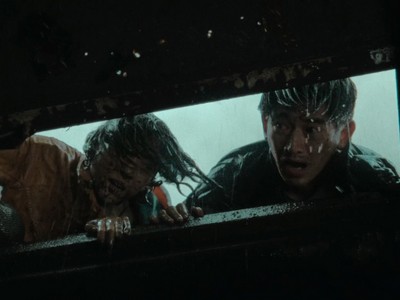
Saori and Hori were clueless at the start of the movie. Despite spotting a few warning signs, they didn't understand Minato's perspective. Saori suspected something troubled her son, but she got misdirected and accused an innocent teacher. Likewise, Mr. Hori misjudged the bullying situation. He treated Minato as a culprit instead of a victim. Both characters lacked insight and didn't take appropriate actions. As Minato suffers, his guardians have failed to protect the vulnerable child.
Minato goes missing on a stormy day. Earlier, he quietly left the house to check in on Yori. His friend suffered another round of domestic violence, so they retreated to their outdoor sanctuary for some happiness. Unfortunately, the hazardous weather puts their safe space in danger. With the boys' lives at risk, Saori and Hori go on a rescue mission. The former foes stop antagonizing each other and communicate instead. That's what they should have done from the start. Minato's parent and teacher are supposed to collaborate to ensure his well-being.
Saori & Hori arrive at the hiding spot. They wipe mud from the train window, but the raindrops obstruct their view. This meaningful imagery represents the characters' limited perspectives. All along, they have failed to see inside Minato's world. His mom and teacher only got quick, inconclusive glimpses into his psychological turmoil. Later, they open the window and gain a broader view of the train interior. It symbolizes a breakthrough. Minato's guardians now have the insights to recognize his troubles. With a better understanding, they can save the child from his inner demons.
Principal
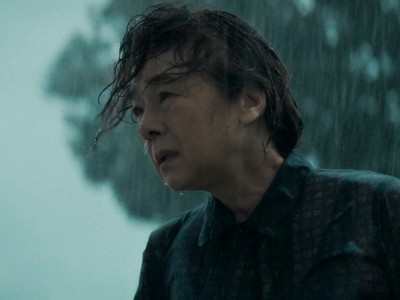
The school principal is a morally questionable character. The movie invites viewers to judge every controversial decision. One, she trips disruptive kids in the store. Right or wrong? Two, she forces an innocent teacher to admit guilt. Right or wrong? Three, she kills her grandchild and lets her husband take the blame. Right or wrong? Based on her misdeeds, some may argue the headmaster fits the criteria of a monster. IMO, she reminds me of Lady Macbeth when cleaning an imaginary filth on the floor. Out, damned spot!
Early on, you may perceive the principal as evil. Later, the movie shows her softer side. We see her speak gently to her husband. She also provides kind advice to Minato. Have these sympathetic scenes changed your perspective of her? The film wants to challenge our snap judgment. Don't be too quick to condemn anyone without knowing the whole story. You risk wrongfully labelling them as monsters based on a black-and-white view of the world. The moral spectrum has shades of blacks, whites, and greys, as reflected by the principal's various wardrobe choices.
Out of everyone, the principal is the character who sees through Minato's facade and senses his struggles. She can communicate with him more effectively than the other adults. Her insight may come from years of experience as an educator. She also relates to Minato's burden of guilt. Carrying a shameful secret of her own, the headmaster observes life beneath the surface level. She spots a troubled child and doesn't judge or interrogate him. Instead, she simply wants to help. Whatever your worry is, you don't need to tell me. I only wish to alleviate some of your pain.
Perspective
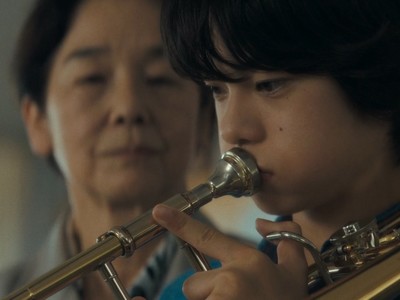
The principal's advice mirrors the movie's ongoing message about perspective. Throughout the story, it has encouraged both the characters and audience to see nuance. Don't perceive life through a narrow view. Instead, change your angle. If you can't fix a problem, try an alternative. If you can't tell your secret, blow it away. The principal recommends using music to lift the weight of Minato's unspeakable burden. Art, in its various forms, is a therapeutic method of self-expression without verbalizing your thoughts.
Minato is a gay youth who sees the world from a heteronormative point of view. His mother, teachers, and classmates all reiterate this perspective. He agonizes over his sexuality, believing it makes him abnormal. He can't reveal his attraction out of shame. "They'll know I can never be happy." Poor Minato thinks being gay denies him a fulfilled life. Earlier, the movie included scenes of Minato & Yori in cages or behind gates. The imagery represents how society restricts positive experiences for the LGBTQ+ community. Children face even more barriers due to their limited autonomy.
Minato may think his future appears bleak, but he should change his perspective. Don't judge the outlook of your life based on a heteronormative criteria. Instead, the principal encourages Minato to redefine the meaning of fulfillment. "If only some people can have it, that's not happiness. Happiness is something anyone can achieve." As a child, Minato only has partial insights. Once he broadens his horizons, he'll discover experiences that bring greater joy than traditional customs. You don't have to marry or start a family to prosper. Happiness is defined by how you perceive it.
Monster Movie Ending Explained
Ending
Discovery
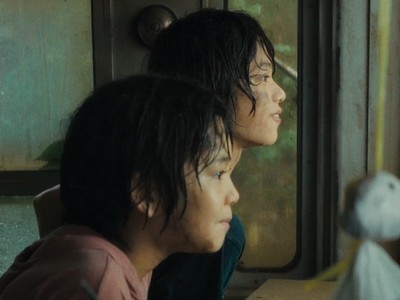
The young protagonists begin the movie with inner demons. Like many gay kids, they struggle with their sexual orientation. Minato's challenges involve self-loathing, whereas Yori endures abuse in school and at home. Both find comfort in each other's companionship, but they still feel hopeless about their futures. Unfortunately, their parents and teachers have missed the distress signals. Hindered by a lack of insight, the adult guardians failed to protect the vulnerable children. The psychological monsters are winning.
Near the end of the story, Minato's mom & teacher understand his problems better. They arrive to rescue him on a stormy day, but Minato has already saved himself. After receiving the principal's advice, he learns to change his perspective. Don't define happiness by a heteronormative view. Instead, he can have a different sexuality than the norm and still live fulfilled. Also, Minato helps Yori escape from his abuser. Unlike before, he won't abandon his friend. The film emphasizes Minato's support with multiple shots of him assisting Yori on the ladders. They'll go on their journey together.
Minato and Yori escape the storm by climbing into the sewers. The dark tunnel is gruelling to navigate, symbolic of the hardships faced by LGBTQ+ youths. Life can feel like hell whenever they stray from the straight, predefined path. Yet, the movie remains hopeful about their future. The characters may be surrounded by darkness. However, they can see a light at the end of the tunnel. After their adolescent journey, they'll unlock adulthood and discover new experiences. Once they persevere through childhood adversity, a world of freedom awaits them.
Diversity

After leaving the tunnel, our protagonists have a meaningful exchange. Yori asks if they have been reborn, but Minato confirms they're still the same. This chat addresses their positive outlook. Before, the children felt so hopeless about their circumstances that they wished for another existence. Please let us have a different life! But now, their views have evolved. They learn to feel content with their current identities. Yori and Minato accept their destinies optimistically.
The movie emphasizes Yori and Minato's positivity with the improved weather. The storm has passed, revealing a sunny day with clear skies. Metaphorically, they don't feel bleak about their futures anymore. As the boys approach the world with vigour and excitement, they have conquered their inner demons. In addition, they broaden their horizons. Both run freely in a vast field with great enthusiasm. The protagonists realize they don't need to follow a predefined path to achieve happiness. They can explore a diverse life to their heart's content.
Monster is a movie about perspectives. It is separated into three arcs, each told from a different point of view. We only understand the whole reality by combining everyone's insights. The filmmaker emphasizes the power of nuance. Don't limit how we see life to one viewpoint. Like the protagonists, the audience should embrace a diverse vision. Avoid perceiving one way of life as the only normal. Some monsters are created due to society's preconceived notions of normalcy. Instead, let's empathize with those unlike the norm and understand their perspectives.
Monster Movie Information
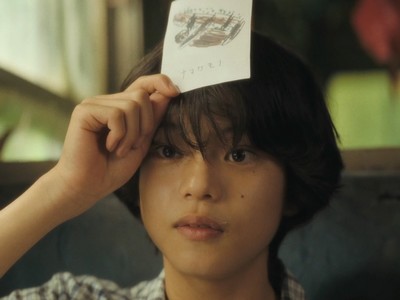
- Start Date May 17, 2023
- Movie Length 2 hours
Monster is a Japanese movie that released on May 17, 2023. It is a long film, which you can finish in around 2 hours. Hirokazu Koreeda (是枝裕和) is the director of Monster.
Since its release, Monster was nominated for many awards in film festivals. It has won the Queer Palm award at the Cannes Film Festival.
Links
- Instagram Monster Instagram
- MyDramaList Monster MyDramaList
- Twitter Monster Twitter
- Website Monster website
- Wikipedia Monster Wikipedia
- Wikipedia 怪物 Wikipedia
Will there be a Monster 2 ??
Realistically, no. I don't think the Monster movie will make a sequel, especially with child actors as the leads. This story doesn't feel like a franchise, y'know?
Creatively, it would be interesting to see another story continuing Minato and Yori's life as teenagers or adults. Explore their romance and make them live happily ever after!
Thanks for this review- this has a movie showing in my city:)
Would not have known of this one!
Yeah, I didn't know about Monster until a few readers recommended it to me. I'm very glad they brought this movie to my attention and spoke highly of its merits. They helped me add a great film to my life.
Hope you enjoy! 😄
Well wow wow wow—–my friend and I saw this and loved it. So much to chew on. Rashoman type story- where things change and shift. Great script and direction. Terrific acting by entire cast. The music and cinematography are top notch. I am happy to have seen it at a movie theatre. Strong A grade from me.
_________________________________________________________
Spoilers below:
I only read your summary before seeing the film- enjoyed your analysis- especially the one about the teacher and mom peering through the mud and unable to see clearly.
One of many themes that runs through is "crossing the line" as metaphor. The mother has warned her son in a "walking game" and later says it of herself: "I crossed the line and now I'm in hell". And there is reason to believe that all of the main characters for various reasons have crossed the line and are in hell. The teacher is even judged by his hostess girlfriend for having "weird hobbies". He in turn is judged for having being "at" a hostess bar. The principal is obvious in where she has crossed over- and so far is getting away with it more than most- her husband is in jail but she still has a position of power- though she only comes alive and is human in her indelible scene teaching the lead about music and happiness.
And aren't the audience members also monsters- for judging each character "Oh you're like THAT!" and then sheepishly reconsidering as new information comes our way.
The happy ending: I'm obsessed with this film- easily my fave so far this year. Do the boys die in order to be free of judgement and happy? One boy says yes, the other no.
In the original screenplay the ending was (I read at least): the parent and teacher opening the door of sanctuary and seeing the boys muddy but unharmed. The boys wave to them as film ends.
However- the director said during the pandemic he and screenwriter had time to polish the script and make it perfect. To me- the ending is open to interpretation. The boys are free and happy for the moment in any case.
Well I could opine on and on about this movie and potential meanings and underlying messages. If anyone wants to weigh in- I have same name on mydrama- you will find me on movie comments bulletin board:)
I still don't understand what made him jump off the moving car his mother's driving.
It is a severe reaction to his worry about never being able to fulfill what his mom is saying makes life worth living- despite her own (most likely) imperfect marriage. He has just come out of hospital afraid that the MRI will confirm that he is indeed a monster.
Later, Mr Hori also contemplates suicide. Japan has a high rate of suicide and it had the 2nd highest rate of suicide among developed countries as of 5 years ago.
Of course- we can't really know why that character did that- and the movie is always wanting us to use empathy and withhold judgement.
To Toni asking: "I still don't understand what made him jump off the moving car his mother's driving"
I think that Minato jumps off to be able to answer to the incoming call from Yori.
I witnessed a conversation in the youtube comment section, where someone told us, that there is an extended edition with even more heartwrenching moments on the BluRay to the movie…
I dont have a bluRay recorder… and i dont think i'll buy one for just one film, but it kills me to not watch it…
If anyone knows where to find this on the internet, pls tell us!